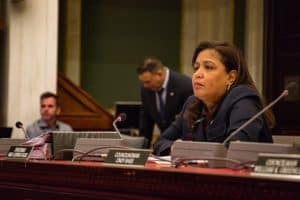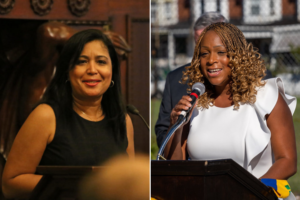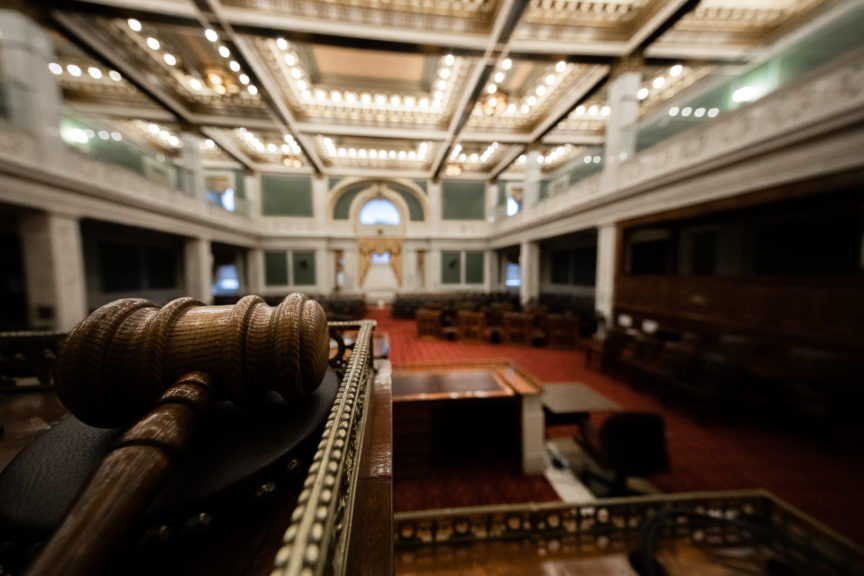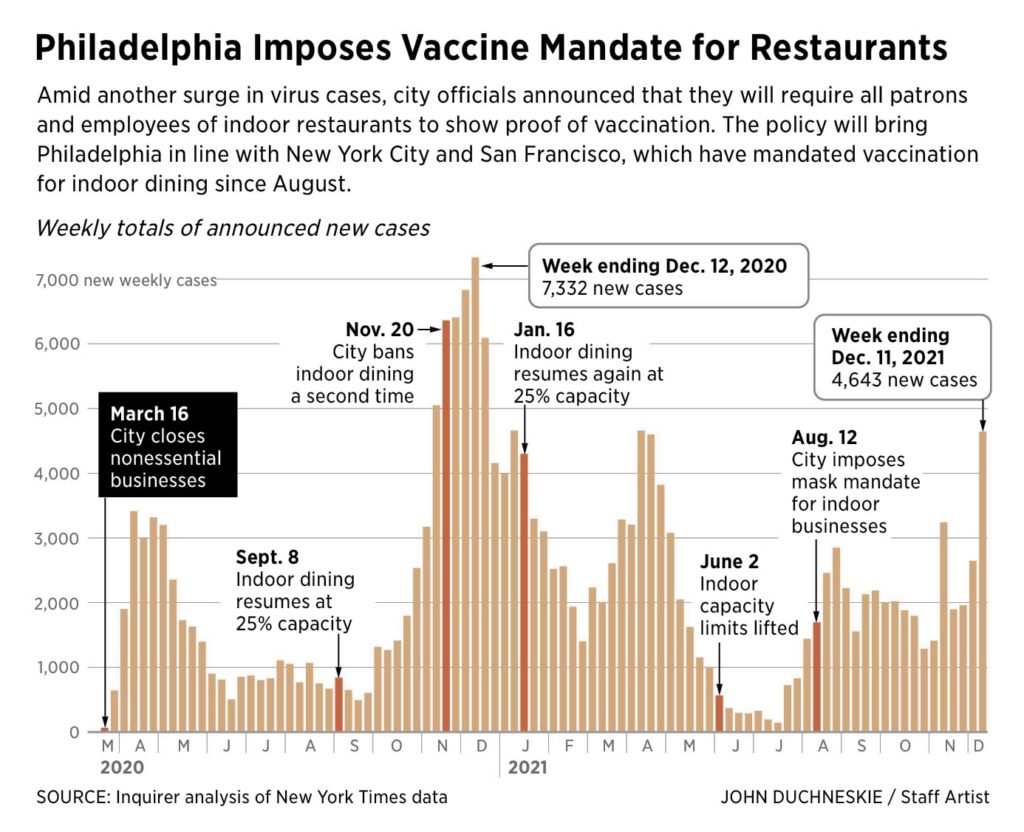COUNCILMEMBER QUIÑONES SÁNCHEZ INTRODUCES BILL TO SET $25K LIMIT ON OUTSIDE INCOME FOR COUNCILMEMBERS
 Acting in response to the conviction of a member of City Council in a corruption case, Councilmember Maria Quiñones Sánchez (7th District) this week introduced legislation that would establish an annual $25,000 limit on the amount of outside income that any Councilmember could earn, apart from their city salary.
Acting in response to the conviction of a member of City Council in a corruption case, Councilmember Maria Quiñones Sánchez (7th District) this week introduced legislation that would establish an annual $25,000 limit on the amount of outside income that any Councilmember could earn, apart from their city salary.
Under the proposed ordinance, introduced at Council’s final Meeting of 2021, under the “Outside Employment” section of the Philadelphia Code, “No member of Council shall engage in any activity, other than the official’s City responsibilities, that produces for the member earned income in excess of $25,000 in any twelve-month period.”
City Council historically has had no ban or prohibition on members earning outside income or holding outside employment in addition to their elected jobs on Council. Members have worked as attorneys for law firms in town or for their own practices; other members have worked in the business community, or held other kinds of positions paying them outside income.
Quiñones Sánchez’s legislation, which will be heard by Council upon their return in January, also proposes new language in the city code to clarify and expand the amount of information which members would be required to file in their annual statements of financial interest. The proposed language requires that “if the filer is a member of Council, a statement of the filer’s duties with respect to such income or the nature of the filer’s investment that produced such income, in sufficient detail to determine what conflicts of interest, if any, may arise out of such income.”
Quiñones Sánchez’s legislation follows the recent conviction in federal court of Councilmember Bobby Henon (6th District) on various charges related to his dual roles within Council and also Local 98 of the International Brotherhood of Electrical Workers, where Henon also held an outside job while he served on Council.
This ethics reform bill will be considered by Council early in the new year, after Council returns to session on January 20, 2022.
COUNCIL APPROVES LEGISLATION TO RESTRUCTURE THE ZONING BOARD OF ADJUSTMENT
Legislation that would reform the Zoning Board of Adjustment, a city agency that regulates land-use decisions and development projects, received unanimous approval in Council this week.
Under the reform legislation approved by Council:
• The Zoning board would increase in size from five to seven members;
• The board’s appointees would become subject to a public Council confirmation hearing, increasing transparency and accountability; and
• The board’s appointees would need to possess specific professional qualifications and sensitivity to community concerns.
“The Zoning Board of Adjustment needs to be reformed,” said Council President Darrell L. Clarke (5th District), who had the reforms introduced in Council by Majority Leader Cherelle L. Parker (9th District). “We have heard from residents and citizens across the city that their voices –the voices of the community – are not being heard by the ZBA, as it makes zoning decisions that have a fundamental impact on the quality of life and the character of Philadelphia’s many neighborhoods. That must change, and that’s why I strongly supported passage of Resolution No. 210692 and Bill No. 210669.”
Because the legislation involves changes in the composition of the Zoning Board, which is governed by the Home Rule Charter, the reforms must first be approved by city voters, who will get the opportunity to vote on the issue in May 2022.
Multiple city residents testified during public comment at Council’s Meeting this week in support of the reforms, while several others testified in opposition.
During a recent hearing in Council on the legislation, Catherine Blount, a city resident and co-chair of a registered community organization (RCO) in West Philadelphia, offered testimony in favor of the legislation that captured why neighborhood residents seem in favor of these reforms.
“The proposed legislation and resolution are important first steps in preserving our neighborhoods, protecting our communities, and supporting Philadelphia residents,” Blunt wrote in her testimony. “It will especially aid in protecting our seniors and others on fixed income. These vulnerable communities are threatened with displacement resulting from increased property taxes and rising rental costs that can be traced back to faulty ZBA decisions in conjunction with other initiatives that are promoting gentrification of our residential and vulnerable neighborhoods.”
CITY COUNCIL APPROVES FIRST LARGE-SCALE MANDATORY INCLUSIONARY ZONING LEGISLATION
 A new Mixed Income Neighborhoods Overlay bill, offered by Councilmembers Jamie Gauthier (3rd District) and Quiñones Sánchez, and requiring that affordable housing be part of new large development projects, received final approval in Council.Thebill will apply to select tracts of the 3rd and 7th Districts that are seeing increased market pressuresand gentrification where Philadelphia residents will be especially vulnerable to displacement without additional policy interventions.
A new Mixed Income Neighborhoods Overlay bill, offered by Councilmembers Jamie Gauthier (3rd District) and Quiñones Sánchez, and requiring that affordable housing be part of new large development projects, received final approval in Council.Thebill will apply to select tracts of the 3rd and 7th Districts that are seeing increased market pressuresand gentrification where Philadelphia residents will be especially vulnerable to displacement without additional policy interventions.
“The continued growth of our city is important, but it’s unacceptable if it comes at the detriment of vulnerable Philadelphians,” said Councilmember Gauthier. “With many developers prioritizing profits, regardless of the social repercussions, the best way for us to ensure that affordable housing options remain available in desirable neighborhoods over the long-term is to enact policy change. I’m grateful to Councilmember Sánchez for her partnership in this effort, and to my Council colleagues for their support of this legislation.”
The legislation will require 20 percent of the units in any new housing development with ten or more residential units within the overlay boundaries be made available at restricted pricing for a 50-year period. At least fifteen percent of those units must be on-site; the bill offers the chance to apply for a waiver from the Planning Department to fulfill up to five percent of the requirement via offsite units or a Housing Trust Fund contribution. These units must be affordable for rental households earning up to 40 percent area median income (AMI), and for owner-occupied households earning up to 60 percent of AMI.
“Diverse, mixed income neighborhoods need strong public policy that incentivizes and promotes equitable development,” said Councilmember Sánchez. “Piloting more aggressive public policy will help us meet the greater housing needs.”
The Philadelphia Zoning Code currently has a program that incentivizes property owners to build affordable housing, but it is optional and does not require new units to be built in the neighborhoods where development is occurring. Both Councilmembers see the Housing Trust Fund as a vital resource for creating housing security in Philadelphia, but they recognize that there is a significant opportunity for on-site affordability that presents itself with regard to new development projects, and that this should not be taken for granted, especially in neighborhoods that are experiencing heavy development pressure and are vulnerable to gentrification.
“What we’re concerned about is balance—finding ways that development and opportunities for residents in the neighborhoods allow for a blending of people from a variety of socioeconomic backgrounds,” said Reverend Jay Broadnax of Mt. Pisgah AME Church. “We need legislation that encourages that kind of balance, and I believe that this Mixed Income Neighborhoods Overlay Bill is a critical first step in helping to foster that kind of balance.”
The Mixed Income Neighborhoods Overlay bill will go into effect six months after it is signed by the Mayor, who now must consider the legislation as approved.
SEEN ON SOCIAL MEDIA…
Philadelphia has led the country in preventing evictions during the pandemic, reducing evictions by 75% for two years in a row.
Today, City Council unanimously approved my legislation to bring our eviction diversion program into our City’s code. pic.twitter.com/eQ1ovyzvJR
— Helen Gym (@HelenGymAtLarge) December 16, 2021
IN OTHER NEWS…
Council Gives Final Approval to Bill that Extends Philadelphia’s Eviction Diversion Program. Council gave final approval this week to legislation that will extend authorization for Philadelphia’s nationally-recognized eviction diversion program through December, 2022. Introduced by Councilmember Helen Gym (At Large), the legislation extends authorization to Philadelphia to continue operating the program in partnership with the courts and nonprofit partners. Philadelphia’s Eviction Diversion Program has reduced eviction filings by over 75 percent in 2020, with over 93 percent of cases that participated in mediation successfully finding solutions without evictions.
“Philadelphia has proven to the entire country that with bold, smart policies, we can address one of the most pernicious impacts of poverty: evictions,” Councilmember Gym said. “Our commitment now is to a long-term process that protects renters and keeps our communities together. I am grateful for the support of my Council colleagues, partner organizations, city agencies, and municipal courts who have helped bring stability to thousands of families.”
Advocates for lower-income tenants and renters said that prior to the pandemic, Philadelphia had over 19,000 eviction filings annually. These eviction filings overwhelmingly affected Black, female-led households. In 2020, thanks to the city’s eviction diversion program, there were just 6,000 eviction filings. Advocates said the eviction diversion program has enabled lower-income Philadelphians, hit hard by the COVID-19 pandemic, to maintain some stability during a destabilizing time.
Councilmember Gilmore Richardson Introduces Resolution Urging General Assembly to Vote Down Legislation that Could Harm Public Schools. While a historic school funding case is being heard in the Pennsylvania Supreme Court, a member of City Council this week weighed in on the issues surrounding funding and equity in public education.
Councilmember Katherine Gilmore Richardson (At Large), introduced a resolution, which was approved in Council, calling on the General Assembly to reject legislation that she stated could “further harm our young people and school communities.”
Her resolution cited House Bill 412, legislation allowing people with 60 college credits or paraprofessionals to become substitute teachers, as a “slapdash attempt to plug holes created by systemic disinvestment and further removes the critical supports currently offered to students by paraprofessionals”.
The resolution criticized House Bill 1642, which would increase funding in the Educational Improvement Tax Credit and the Opportunity Scholarship Tax Credit – both credits steer state funds towards private and non-public educational institutions – further “expanding inequities in our educational system.”
It lastly criticized House Bill 1332, which calls to empower parents with curriculum transparency, and called for its rejection “for its attempt to codify the silencing of the voices and experiences of people of color.”
OTHER SIGHTS AND SOUNDS FROM THE COUNCIL WEEK
Committee on Finance 12-13-2021
Committee on Children and Youth 12-14-2021
Committee on Education 12-15-2021
Joint Committee on Children and Youth, Finance 12-15-2021
Stated Meeting of Philadelphia City Council 12-16-2021
PHILADELPHIA FACTS AND FIGURES
The next Stated Meeting of City Council is scheduled to take place on Thursday, January 20, 2021 at 10 a.m. The Meeting will be held remotely due to the ongoing pandemic, and will air on Xfinity Ch. 64, Fios Channel 40 and stream at www.PHLCouncil.com/watch.




